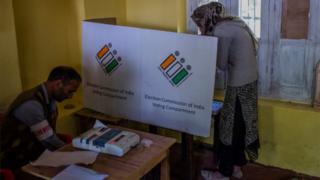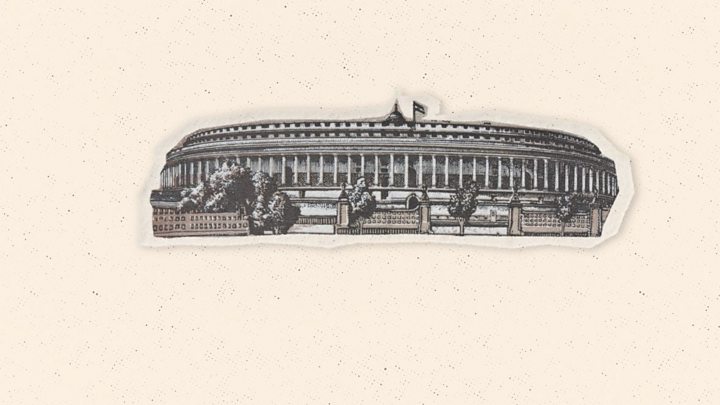Pulwama: Kashmir seat 'rejects' India election
 Image copyright
Getty Images
Image copyright
Getty Images
India is in full election mode: voting began on 11 April, and the final ballot will be cast on 19 May. Every day, the BBC will be bringing you all the latest updates on the twists and turns of the world's largest democracy.
A huge drop in voter turnout at Kashmir suicide attack town
What is happening?
The Anantnag constituency in Indian-administered Kashmir, which saw a militant attack in February that killed more than 40 Indian troops, has recorded a dismally low voter turnout at 8.7% in the fifth phase of India's marathon election.
In 2014, 29% of the registered voters had showed up to cast their ballot in Anantnag, which includes Pulwama town where the attack took place.
The fifth phase concluded elections for all six seats in Indian-administered Kashmir, which witnessed an overall turnout of 44%.
Why is this important?
The voter turnout reflects the battle of narratives in the constituency. Several separatist leaders had called for a boycott of the polls, while political parties and the Election Commission had appealed to people to vote in large numbers.
Anantnag is the only constituency in the country where polling was held in three phases due to security concerns.
"This year was different," Kashmir-based journalist Riyaz Malik told BBC Hindi.
"The Pulwama attack and the tensions with Pakistan dominated the elections. Kashmir has only six seats so it is not as electorally important as other bigger states, but despite this, the region was at the centre of the election rhetoric."
The suicide attack in Pulwama in February, claimed by a Pakistan-based militant group, brought India and Pakistan to the brink of war.
Prime Minister Narendra Modi and his governing Bharatiya Janata Party (BJP) have consistently raised the Pulwama attack during the campaign.
The BJP has often said that Mr Modi's government took a decisive action to "avenge" the attack by sending Indian jets inside Pakistani territory.
Analysts say that Mr Modi and his party could witness a "boost" in votes after making national security one of their main electoral planks.
But Mr Malik believes that this "muscular narrative" may have actually "instilled fear among the locals" in Kashmir.
He added that boycott calls from separatists were common, but locals would still show up and wait in line to vote.
"There is a strong sense of dissatisfaction, which has probably contributed to a low voter turnout this year."
Cyclone Fani back in the eye of the storm
What is happening?
Cyclone Fani, which struck India's eastern coast last week, has become a subject of political bickering between India's PM and a regional leader who has ambitions of becoming the next prime minister.
West Bengal Chief Minister Mamata Banerjee has criticised Prime Minister Narendra Modi after he accused her of "playing politics" over the cyclone.
Mr Modi had accused her of not being serious about assessing the damage caused by the cyclone.
The cyclone killed at least 16 people and destroyed thousands of homes in eastern India last week.
Why does this matter?
The verbal duel between the two leaders reflects the tough electoral battle their parties are fighting in West Bengal.
Ms Banerjee's Trinamool Congress won 34 out of 42 seats in the state in 2014, while Mr Modi's Bharatiya Janata Party (BJP) won two seats. The BJP's may have won just seats but its vote share went up in a state where it hardly had any presence.
In 2019, Mr Modi has reportedly set a target of winning 23 seats, and that seems to have sparked a series of verbal confrontations between the two leaders.
The most recent one started when Mr Modi accused her of not taking his calls to set up a meeting to review the damage caused by the cyclone.
"I tried to talk to her [Ms Banerjee] but her arrogance is so much that she refused to talk to me. I kept waiting with hope that she will call back but she did not," Mr Modi said at a rally.
In reply, Ms Banerjee said she did not consider Mr Modi "the country's PM".
"I do not want to be seen with him on the same platform. I will speak to the next prime minister. We can take care of the cyclone damage by ourselves. We do not need the centre's [federal government] help ahead of polls," she said.
But this wasn't the first time the two leaders have aired their "differences" in a very public manner.
Ms Banerjee protested in the streets of the state capital, Kolkata (formerly Calcutta), in February against what she called the federal government's "intimidation and threats".
You can read more about her standoff with Mr Modi's government here.
On Monday, there were few voters at Kashmir suicide attack town
What is happening?
A constituency in Indian-administered Kashmir which saw a militant attack in February that killed more than 40 Indian troops was among the 51 seats where people are casting their votes on Monday in the fifth phase of polling in India's mammoth general election.
Pulwama district, which is part of the Anantnag constituency, was one of the areas going to the polls, but there were very few people turned up to cast their vote.
The suicide attack in Pulwama in February, claimed by a Pakistan-based militant group, brought India and Pakistan to the brink of war.
Voting is was held under tight security amid calls for a boycott from separatist leaders.
Why does this matter?
Posters calling the election a "sham exercise" was seen in many places in the districts, reported Kashmir-based journalist Sameer Yasir.
As polling booths opened at 07:00, anxious election staff and security forces were seen waiting for voters, our reporter said.
"The streets looked deserted. At certain booths, few voters showed interest in coming out to cast their votes. In the morning, a polling station in Pulwama's Rahmoo village also came under attack from militants, who lobbed a grenade at it."
Elections in Kashmir traditionally see low voter turnout.
Many people in the territory do not want it to be governed by India, preferring instead either independence or union with Pakistan.
High unemployment and allegations of human rights abuses by security forces fighting insurgents have aggravated the problem.
"We don't believe in Indian democracy and its farcical elections here," said Mumeen Ahamd, 28, a Pulwama resident.
All political parties and the Election Commission have appealed to people to vote in large numbers.
The main contenders in the area are former chief minister Mehbooba Mufti, the National Conference's Hasnain Masoodi and the Congress party's Ghulam Ahmad Mir.
Gandhis up for re-election
What is happening?
India's main opposition Congress party president Rahul Gandhi, former Congress leader Sonia Gandhi and home minister Rajnath Singh were some of the big names who faced the ballot on Monday.
Voting is took place in Uttar Pradesh, Rajasthan, West Bengal, Madhya Pradesh, Bihar, Jharkhand and Indian-administered Kashmir.
Why does this matter?
Because it was a battle of big names and there was a lot of prestige on the line.
Rahul Gandhi took on federal minister Smriti Irani in the Amethi constituency of the northern state of Uttar Pradesh.
Amethi will be particularly closely watched as it is the Gandhi family's bastion. Mr Gandhi won the seat in 2004, 2009 and 2014, and his mother, Sonia Gandhi, won it in 1999.
The ruling Bharatiya Janata Party (BJP) said it was confident of defeating Mr Gandhi in his own backyard.
But Congress is expecting another win, with party officials pointing to the fact that Mr Gandhi comfortably defeated Ms Irani in 2014.
India politicians are allowed to contest more than one constituency and Mr Gandhi is also contesting from Wayanad in the southern state of Kerala, where voting has already taken place.
Sonia Gandhi is running in Raebareli - a seat in Uttar Pradesh that she won in 2004, 2006, 2009 and 2014.
India votes 2019
Coverage from previous weeks:
How do you vote in the election?
Here's a video explaining everything that happens inside a polling station - and what happens to your vote after that:
